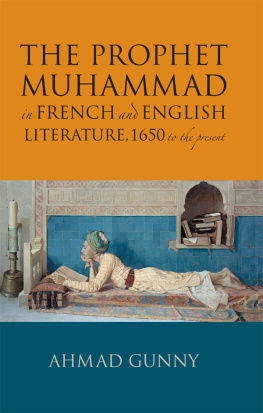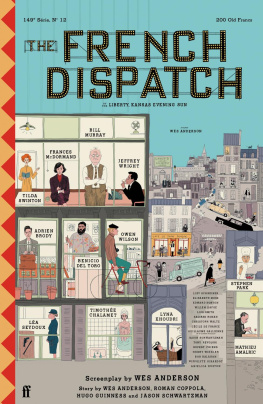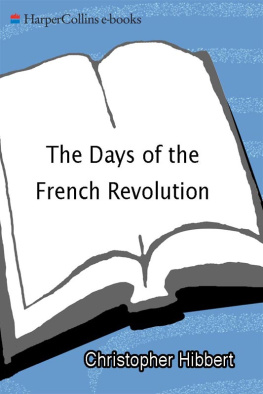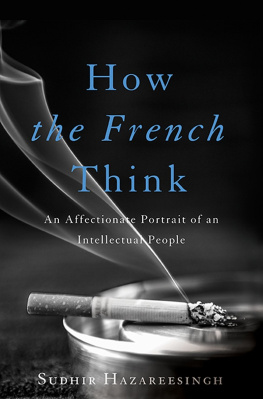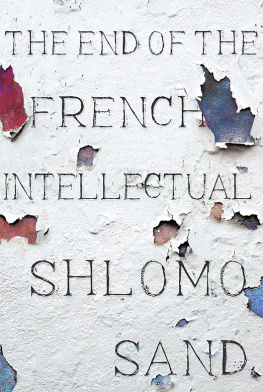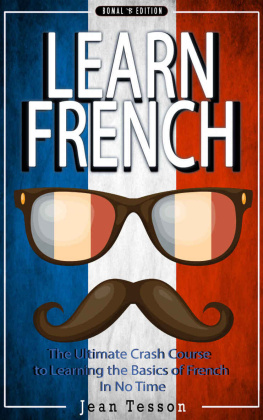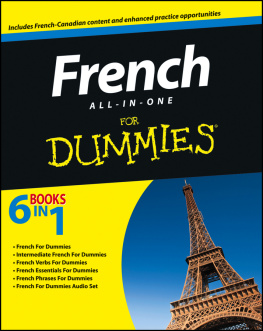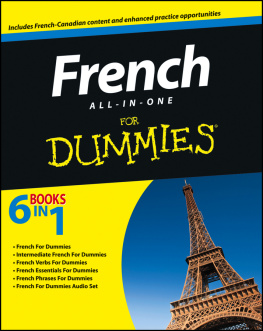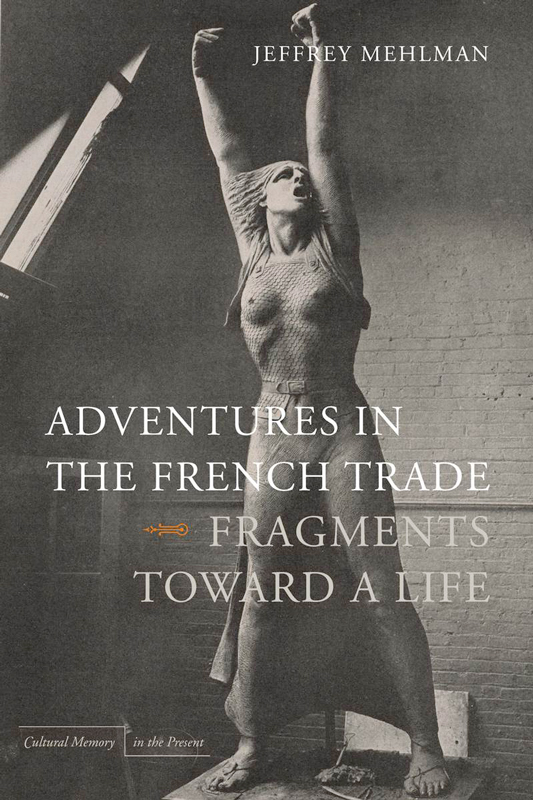Cultural Memory in the Present
Mieke Bal and Hent de Vries, Editors
ADVENTURES IN THE FRENCH TRADE
Fragments Toward a Life
Jeffrey Mehlman
STANFORD UNIVERSITY PRESS
STANFORD, CALIFORNIA
Stanford University Press
Stanford, California
2010 by the Board of Trustees of the Leland Stanford Junior University.
All rights reserved.
No part of this book may be reproduced or transmitted in any form or by any means, electronic or mechanical, including photocopying and recording, or in any information storage or retrieval system without the prior written permission of Stanford University Press.
Printed in the United States of America on acid-free, archival-quality paper
Library of Congress Cataloging-in-Publication Data
Mehlman, Jeffrey.
Adventures in the French trade : fragments toward a life / Jeffrey Mehlman.
p. cm. (Cultural memory in the present)
Includes bibliographical references.
ISBN 978-0-8047-6961-7 (cloth : alk. paper)
ISBN 978-0-8047-6962-4 (pbk. : alk. paper)
ISBN 978-0-8047-7507-6 (electronic)
1. Mehlman, Jeffrey. 2. French studies specialistsUnited StatesBiography. 3. CriticsUnited StatesBiography. 4. LitterateursUnited StatesBiography. I. Title. II. Series: Cultural memory in the present.
DC36.98.M44A3 2010
944.007202dc22
[B]
2009053332
For Alicia
And as he saw from the blank faces of the company that nobody understood a word, he answered her as freely as she asked him, speaking, as she did, in perfect French. Thus began an intimacy between the two which soon became the scandal of the Court.
VIRGINIA WOOLF, Orlando
Contents
Preface
Walser, by the sheer force of dissociation, and certainly without laying claim to any sort of revelation, patiently slackened all the threads that might have given dignity or consistency to his ego.
Roberto Calasso, The Forty-nine Steps
He seemed constrained by his humor like a madman by his straitjacket.
Robert Walser, Mehlmann: A Fairy Tale
This book is less a chronicle of my life as a scholar/critic of matters French than a series of differently angled fragments, episodes, each with its attendant surprise, in what one commentator has called my amour vache, my injured and occasionally injurious love, for France and the French. As such, the reminiscences, readings, letters, and, in one case, fiction that comprise Adventures in the French Trade have something of the coherence of a memoir, a protracted speculation on the question of who, more or less (less more than more?), I will have been.
My reasons for undertaking the project are several. Perhaps foremost is my sense that I have by now been writing long enough to be able to arrive at the kind of insights concerning my own work that I have, up until now, attempted to derive from the reading of others. The discoveries in this realm have for me been bountiful, stunning, and occasionally humbling. They have issued in what is perhaps the centerpiece of this volume, the chapter titled Chiasmus. A second reason is the fact that for a number of years, and most strikingly in the 1970s, I enjoyed a privileged perch from which to view and be part of the arrival in America of what may be the last of the French vanguards. For about a hundred years, for a large number of people in the West, serious intellectual endeavor has been a matter of thinking with (or against) the French. Think of American poetry without symbolism, American painting without surrealism, a whole strain of American fiction without existentialism, and American academia without deconstruction, and you will understand my point. My presence in New Haven, Ithaca, Berkeley, and Baltimore, French thoughts principal ports of call during the 1970s, has supplied me with a host of reminiscences on which I have dined out over the years and which will, I suspect, be of interest to the reader. In addition, my years in Boston have supplied me with the distance from which to gain perspective on the waning of the last of the French vanguards as it has settled into academic respectability. (They have also allowed me to know some remarkably impressive adversaries of the cause to which I have devoted a decade or two of my life.) What I have attempted here is a delineation of how the occasionally polemical episodes I have observed or been embroiled in meshand intersectwith textual analyses that have never ceased providing me with exhilaration.
The question of who I will have been is further complicated by the fact that, over the years, there have been enough people who have written, in anger or enthusiasm, as to who, as a critic, I am for me to want to try my own hand, at least in so far as it concerns my life as a reader and writer, at such a delineation. The identifications I have received from others make for a rather intriguing gallery. Early on, in the pages of Encounter (the distinguished journal which was also a CIA front), Lionel Abel, who knew Andr Breton personally, greeted my first book (on autobiography, as it happens) by claiming that in my contentiousness I resembled no one so much as Breton himself, a man who would grab you by the lapels and start shaking you if you so much as suggested that you could bear to look at a Fragonard. Not that many years later, my book on legacies of anti-Semitism in France had a reviewer in the Nouvelle revue franaise claiming that my true affinity was with Stavrogin, one of Dostoyevskys Possessed. (On that occasion I learned the meaning of the much-abused word collegiality when a Slavist in my department told me not to worry: if you had to be one of the possessed, Stavrogin was definitely the one you would want to be.) On the other side of the ledger, more recently, in the TLS, George Steiner, with consummate generosity, proposed (toute proportion garde) that I was in fact, in what he called my scholastic wit, rather similar to Walter Benjamin. And finally Rgis Debray, no less generously, in a finely wrought piece, opined that I was doingor perhaps better, trying to dofor French literary history what Robert Paxton had done for French political history. Imagine then a room, or better, an ongoing card game, bridge, gathering these four alter egos: Breton and Stavrogin, the possessed, would surely be partnered (as Drieu la Rochelle more or less saw in his novel Gilles), and theyd be playing against the tandem formed by Benjamin and Paxton. And the game itself, from this perspective, would, at some level, be, well... me.
The conceit of the allegedly sovereign subject as a card game has its charms. Queneau, after all, took pleasure in writing the name Descartes in two words, as des cartes (even as Mallarm, who will wend his way through these pages, was of the thought that thought itself, ultimately, was reducible to a crap shoot). In the coda to this book the reader will encounter a more far-reaching interlingual pun on the name of Frances premier philosopher. In the meantime, those four adversaries at bridge will have served to introduce the reader to several of what some have identified as the principal players in my mind.
About twenty years ago, I made my sole appearance, to my knowledge, in a novel. That circumstance is not unrelated to the existence of this book. In My Strange Quest for Mensonge, the British novelist and sometime judge of the Booker Prize, Malcolm Bradbury, delivered himself in 1988 of an academic fiction concerning the effort to write a biography of a deconstructionist academic who had pressed his craft to such an extreme that he had quite simply self-deconstructedor vanished. A bit heavy-handed, to be sure, but not without its lessons. In his search for the eponymous Mensonge, the protagonist, in his frustration, makes his way through the indexes of every available guide to contemporary criticism, all to no avail: the indexes invariably go directly from Mehlman, Jeffrey to Merleau- Ponty, Maurice with nary a trace of the evanescent Henri Mensonge. No more than a cameo appearance, to be sure (my most memorable moment coming in the novels fictive index, where my name is followed by the clarification: his role in indexes), but one that has remained with me over the years. As decades have passed and I find myself a bit less frequently listed in the indexes of critical guides, I am inclined, before I too go the way of Henri Mensonge, to offer a corrective to Bradburys preposterous conceit and show just how indelible a mark the deconstructive sensibility can leave in ones sense of self.


